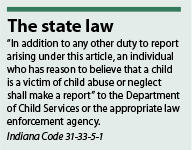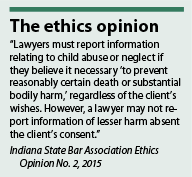Subscriber Benefit
As a subscriber you can listen to articles at work, in the car, or while you work out. Subscribe NowCharges that former Park Tudor basketball coach and teacher Kyle Cox attempted to coerce and entice a 15-year-old student into a sexual relationship — and an attorney’s alleged actions after learning of the accusations — have refocused attention on a 2015 advisory ethics opinion that largely exempts lawyers from a law that requires reporting suspected child abuse.
 Drobac
Drobac“It’s a problem,” Indiana University Robert H. McKinney School of Law professor Jennifer Drobac said of the Indiana State Bar’s Ethics Opinion No. 2 of 2015. She likened it to a hypothetical opinion that permitted a lawyer to steal funds from a client.
After a March 1 talk at the law school regarding the case she referred to as “Indy Doe,” Drobac pointed to the plain language of the child abuse reporting statute under Indiana Code 31-33-5. “If there is a reporting obligation in the statute, there is an obligation for the individual to report, and lawyers are not excused.”
The state bar’s opinion that an attorney’s duty of client confidentiality is generally paramount to the duty to report suspected child abuse is “is a difficult one on which reasonable, conscientious lawyers can disagree,” the opinion itself says. It’s also a question Indiana courts have yet to rule on.
 Lawyer’s role
Lawyer’s role
The federal criminal complaint against Cox revealed Park Tudor administrators and the school’s attorney, subsequently identified as Ice Miller LLP partner Michael Blickman, did not immediately report the suspected abuse. The girl’s father met with Blickman and school headmaster Matthew D. Miller in December and provided sexually explicit texts and images exchanged between Cox and the girl. The next day, a school staff member reported the suspected abuse, but the report was based only on information provided by an attorney representing the school, the complaint says. “The reporter … claimed not to know if pictures were exchanged between Cox and the student,” according to the complaint. Cox resigned afterward.
 According to the timeline laid out in the federal complaint, before a Park Tudor staffer reported the allegations to the Department of Child Services, the lawyer made copies from the father’s computer of documents that included “a visual depiction of a minor engaged in sexually explicit conduct.” Investigators didn’t learn about this until three weeks after the initial report of suspected abuse was made. The lawyer invoked attorney-client privilege when investigators sought the information he copied. They were only able to obtain it after executing a search warrant at the law firm a couple of days later.
According to the timeline laid out in the federal complaint, before a Park Tudor staffer reported the allegations to the Department of Child Services, the lawyer made copies from the father’s computer of documents that included “a visual depiction of a minor engaged in sexually explicit conduct.” Investigators didn’t learn about this until three weeks after the initial report of suspected abuse was made. The lawyer invoked attorney-client privilege when investigators sought the information he copied. They were only able to obtain it after executing a search warrant at the law firm a couple of days later.
About two weeks later, Miller committed suicide, but authorities have not linked his death to the investigation.
Blickman has not been charged. Authorities have said the case remains open. “We don’t have any further comment,” said Tim Horty, spokesman for Josh Minkler, U.S. Attorney for the Southern District of Indiana.
Ice Miller managing partner Judy Okenfuss issued a statement in response to messages seeking comment from Blickman. “We stand by the integrity and character of Michael Blickman, an attorney who has devoted his life to family, community and excellence in the practice of law. We look forward to a comprehensive release of all facts related to the matter and urge others to let the legal process run its course before reaching conclusions.”
Conflicting advice
The Park Tudor situation has rekindled debate of the ISBA ethics opinion that triggered outcry among the public and some attorneys after its adoption last year. The opinion says, “the Committee believes the lawyer’s duty of confidentiality is generally paramount over the general duty to report.” The exception to that rule is when the attorney may believe reporting is “necessary to prevent reasonably certain death or substantial bodily harm.”
Lisa Tanselle, general counsel for the Indiana School Boards Association, said lawyers who represent schools are trying to adhere to the ethics opinion while also making sure children are safeguarded. It’s unusual that lawyers are the first to learn of allegations of abuse, she said, because school administrators usually get the news first. “We tell attorneys, ultimately they have to make decisions about what their obligation is as an attorney representing a school corporation,” she said.
Tanselle said she’s familiar with cases in which a lawyer has become aware of abuse allegations and insisted a school official make the report, sometimes even insisting on witnessing the phone call to authorities.
Indiana Supreme Court spokeswoman Kathryn Dolan said the court has not adopted the ISBA’s ethics opinion as its own, and failure to report suspected child abuse has never been a factor in any public attorney discipline case.
She said Disciplinary Commission officials could not comment on when a lawyer may or may not have a duty to report suspected child abuse because there are no cases directly on point. She said, though, the court made its views on the reporting statute clear in Smith v. State, 8 N.E.3d 668 (Ind. 2014). There, justices affirmed the failure to report conviction of a Muncie high school administrator who delayed reporting a student’s allegation of rape for four hours to conduct an internal investigation. The statute’s plain language requires immediate reporting of suspected abuse.
Confidentiality vs. state code
School administrators, though, are not subject to Rules of Professional Conduct regarding confidentiality. St. Joseph Probate Court Judge Graham Polando chairs the ISBA ethics committee and said the opinion sought to clarify when a lawyer is and isn’t required to report. He said the opinion speaks for itself. “I think any other statement would stray beyond my authority and risk oversimplification,” he said.
“It is well-settled that a lawyer’s duty of confidentiality, which covers all ‘information relating to representation of a client’ (Indiana Rule of Professional Conduct 1.6), is much broader than the mere communications protected by attorney-client privilege,” he said.
Nevertheless, one lawyer who spoke on condition of anonymity said if made aware of an allegation of child abuse, he would report anonymously.
DCS spokesman James Wide said confidential reporting is an option, though it’s not ideal because it would make any follow-up questions impossible. Nevertheless, he said the DCS’ position is simple: “Everyone is a mandatory reporter of suspected child abuse and neglect.”•
Please enable JavaScript to view this content.
